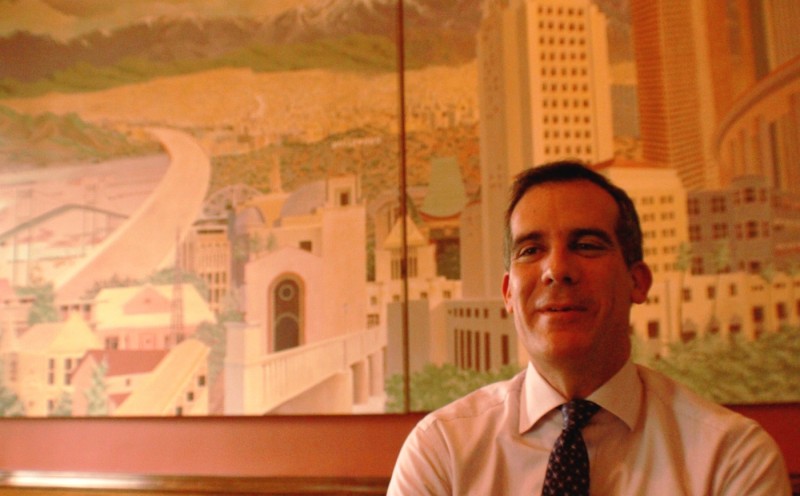http://www.kqed.org/.stream/anon/radio/tcrmag/2014/02/2014-02-07b-tcrmag.mp3
Los Angeles Mayor Eric Garcetti took office last summer and wasted no time setting a different tone from the man he replaced, Antonio Villaraigosa. The former city councilman is L.A.'s first Jewish mayor -- but he's also half Latino and fluent in Spanish. The former Rhodes scholar can dance salsa, plays jazz piano and is a bit of a computer geek who designed a mobile app to improve city services. We sit down with Mayor Garcetti in his office to talk about his efforts to make local government more efficient.
ERIC GARCETTI: The city and the city government in general are a few decades behind in terms of technology, in terms of management culture and leadership development. We have some superstars and some great success stories. Look at the Los Angeles Police Department. We're now the safest big city in America in terms of violent crime per capita, unthinkable 10, 15 years ago. So, I've brought kind of a different management approach. I re-interviewed all of our general managers. I didn't just tell them you're going to have the job no matter what, made some changes, and I'm really looking at people setting numerical goals that we can measure. The people can hold me accountable, I can hold my managers accountable, and if we can make customer service and technology hallmarks of what a modern city government looks like, I think it can inspire not only Los Angeles, but the nation about how a city can be run.
SCOTT SHAFER: As you know, your fellow mayor in San Jose, Chuck Reed, is promoting a ballot measure that would give cities and local governments more flexibility in changing pension and retirement health benefits and so on. Do you support that measure or that approach, at least?
GARCETTI: Well, I understand why Chuck would do that and I think a lot of cities have felt hamstrung. Really the combination of management and labor together have too often put their head in the sand and pretended there wasn't a problem. We took a different approach here and we've been very successful, which is to actually sit down and negotiate and to face the music. We made the biggest change in pension reform in the country of any big city, going from 2 to 6 percent of people’s salaries for their benefits to up to 11 percent. For our sworn personnel, fire and police, we put something on the ballot, successfully passed that without their opposition. So, I think when you can engage unions to do that. … At the Department of Water and Power, we just had a historic contract that I helped negotiate that established a much more sustainable brand-new pension tier. That’s probably a better approach because the lawsuits aren't just from unions. But individuals can sue when you make these changes and you can get caught in the courts for a long time. So, I think it’s really important for leaders to just tell the truth, to be blunt, and to demand that everybody come to the table -- but at the end of the day, do that together.
